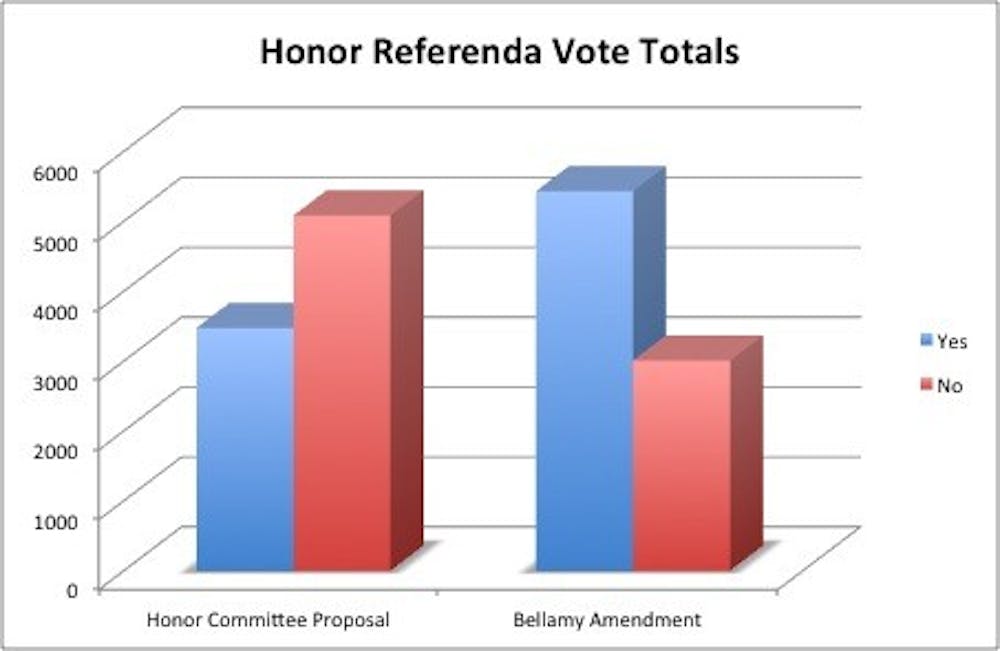A proposal to add informed retraction to the Honor Committee’s constitution was approved last week by about 64 percent of the 8441 students who voted on the amendment in the University-wide elections. The proposal, introduced by second-year Law student Frank Bellamy, separated informed retraction from the jury reform proposal it was linked to in the Honor Committee’s controversial Restore the Ideal Act.
The amendment allows students who have been reported for an honor offense to submit a guilty plea and leave the University for two semesters through the process of informed retraction, if they plead guilty before the official investigation takes place.
Students rejected the Reform the Ideal Act by a margin of about 41 to 59 percent. The Act tied informed retraction to a jury reform provision that would have required all honor trial juries to be composed of only elected Committee representatives. Under the Committee’s constitution, students are still entitled to a randomly selected jury of students. Both referenda needed 60 percent of voters’ approval to be enacted.
Bellamy said in an email the student body’s approval of his amendment would improve some facets of the current honor system.
“It is my hope that this reform will fix or at least ameliorate some of the problems with the system, and that reporting will increase,” he said. “Only time will tell for sure what the effects of this reform will be.”
But outgoing Committee Chair Stephen Nash, a fourth-year College student, said he did not think the measure had corrected persistent issues within the honor system and student engagement with that system.
“The problems we identified aren’t going to go away and still exist today, just as they did yesterday, just as they did 13 years ago,” Nash said.
Nash said it would be up to the incoming Committee to pass permanent bylaw changes allowing the new measure to take effect. Since the new Committee does not take office until April 1, the current Committee passed temporary bylaws Sunday enacting informed retraction. These temporary bylaws closely mirror the version of informed retraction that the Committee proposed in the Restore the Ideal text, and will stay in place until May 1.
“I will be working very closely with next year’s committee,” Nash said. “We will have several conversations with them [and] we hope they will be able to build off the work of this year.”
Nash said what informed retraction will look like also remains ill-defined, although he hopes the incoming Committee will approve the outgoing Committee’s version of informed retraction.
Students’ Honor Caucus President Elliot Oakley, a fourth-year College student, had opposed both Bellamy’s proposal and the Honor Committee’s proposal, but said students’ vote to approve Bellamy’s amendment “demonstrated an intent to improve and reform the system.”
Oakley said, however, he thought this measure had passed, in part, because jury reform had dominated the discussion around the Committee’s proposal.
“I don’t think our campaign efforts on informed retraction were as effective,” Oakley said. “From the beginning, it seemed like honor was arguing more on jury reform, and we took up that same issue.”
Like Nash, Oakley pointed to a number of unresolved ambiguities inherent in Bellamy’s amendment. The Committee must now decide how to justly handle international students, students on athletic scholarships and students receiving other types of financial aid, all of whom would likely experience difficulty returning to the University after a two semester suspension resulting, Oakley added.
“I think over the rest of the semester, there is going to be a discussion about whether or not the system was viable,” he said. “I would implore students to be involved in that conversation.”
Nash said the new Committee chair and other officers would be chosen at the end of the month, paving the way for the process of permanent bylaw proposals to be deliberated and passed. Nash said student engagement would continue to be a top priority.
“I hope that [this vote] will cause more students to buy into the system, report into the system and use the system,” Nash said.







